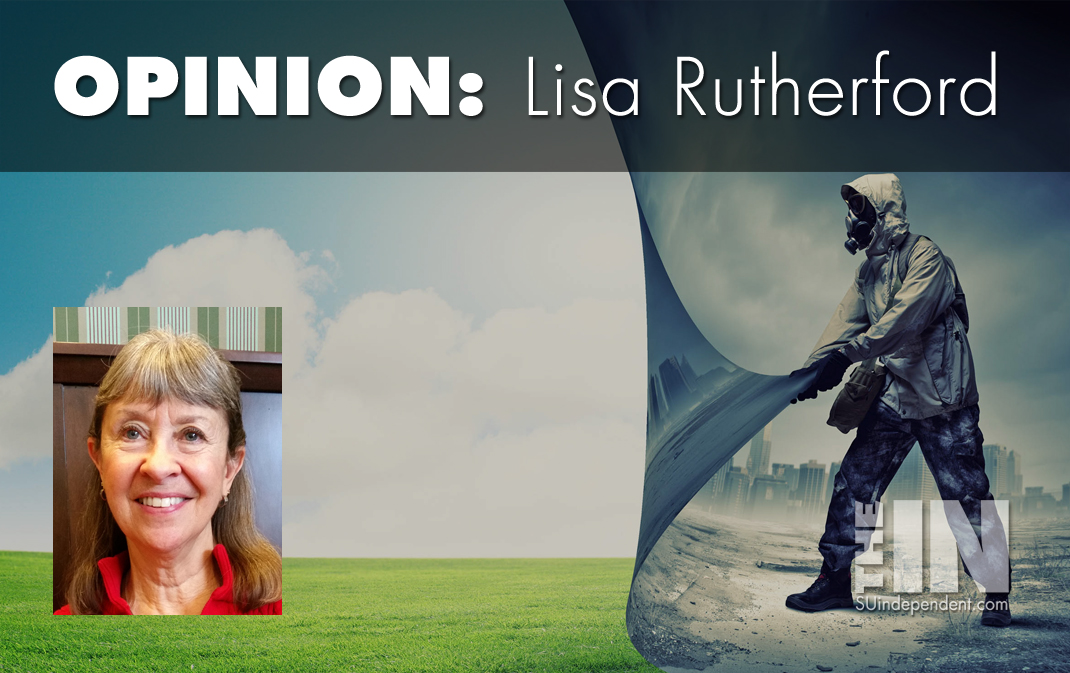
Writer’s block and other challenges
– By Lisa Rutherford –
For a couple of weeks, I’ve been unable to focus and produce an opinion piece. There have been too many forces pulling me. Should I write again about Clean the Darn Air, an initiative effort on which I’ve been spending much time and energy every Saturday at Vernon Worthen Park near the St. George Farmers Market collecting signatures? Should I write about the recent mass shooting in a Nashville school and my despair over this nation’s rampant gun-violence? Should I write about the Silicon Valley Bank failure and the fed’s bailing out those who have more money than all who are reading this opinion piece combined, or about that the bank should have known they’d stocked up on too much low-interest, long-term debt in an environment when interest rates could only go higher? Should I write about my conflicted feelings about Donald Trump’s indictment and whether that is a good or bad thing for this nation? Sometimes it’s just too overwhelming for my little mind to manage.
So, given that writing about any but one of these issues will have no effect on the ultimate scheme of things — not to say I haven’t written about such things in the past and may in the future — I’m turning again to the Clean the Darn Air initiative in hopes that at least with that I have a shot at doing something productive. I’m turning to it because it’s important and because my recent experience while gathering signatures to get the initiative on the 2024 ballot has been enlightening.
For the past month, I’ve spent hours at Vernon Worthen Park meeting people and attempting to get their signatures on the petition. I am not naturally an outgoing and gregarious person, but this issue has inspired me to put on my big-girl pants and get with it.
I’ve learned during these times of approaching people I don’t know that I must just take a deep breath and start by asking, “Are you a Utah voter and are you interested in helping to keep our beautiful area’s air quality clean while we grow to half a million people in the next 30-35 years? We’re already near 200,000 and don’t want air like Salt Lake City has.” Many people just ignore me or say, “No, the air’s fine,” or something to that effect. But then there are those who stop and are willing to talk about it and learn about the initiative.
And, the people who are interested and who sign the petition comprise a mixed bag. Many young people with kids are immediately interested and agreeable, but others with kids couldn’t care less. I’m not sure what they’re thinking, but it doesn’t seem they’re really considering the kids’ futures very well. There are older people, like me, who won’t even be here in 30-35 years who want to be proactive and at least try to leave the place better for others. But there are plenty of oldsters who don’t care what the future air quality may hold. It’s rather like the saying my mother had, “Pull up the ladder, Jack. I’ve got mine!”
Admittedly, there’s some confusion about the grocery store food tax issue that the initiative deals with because the Utah House of Representative recently passed HB54 which would remove the grocery store food tax, too. But, HB54 is linked directly to Senate Joint Resolution 10 (SJR10), which will be on the 2024 ballot. If approved, SJR10 would amend Utah’s constitution and severely weaken school funding. Basically, in that situation, voters are being asked to choose between saving money at the store but reducing funding for children’s education. Not a fair choice in my opinion.
The Clean the Darn Air initiative, on the other hand — a more balanced approach — would also eliminate the state tax on grocery store food but would not affect education money. Rather, the food tax would be replaced with a tax on carbon. So, it’s not a new tax, just a tax shift. It would provide $100 million a year in clean air programs through this modest carbon tax. It would also expand the state’s Earned Income Tax Credit match for low-income working families many of whom would be the most effected by pollution.
Being proactive is not something at which humans excel. Rather, we have been conditioned throughout the course of our existence to be more inclined to seek immediate gratification, and this consumer-oriented society in which we live provides plenty of opportunity for that. Although this initiative will not provide immediate gratification when it comes to solving our pollution problems, current and future, it will provide some immediate gratification at the grocery store by lessening that tax burden.
If we can get people to think a bit more about how they use carbon in their lives, perhaps they’ll be able to save there, too — more immediate gratification!
Viewpoints and perspectives expressed throughout The Independent are those of the individual contributors. They do not necessarily reflect those held by the staff of The Independent or our advertising sponsors. Your comments, rebuttals, and contributions are welcome in accordance with our Terms of Service. Please be respectful and abide by our Community Rules. If you have privacy concerns you can view our Privacy Policy here. Thank you!
Click here to submit an article, guest opinion piece, or a Letter to the Editor




